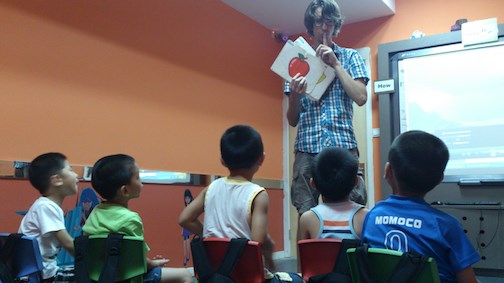How was your first week in China?
My first week was quite hectic, especially the first day arriving in Ningbo, a city pretty close to Shanghai, where I worked during my first year in China.
I remember a very long flight, with multiple layovers. Once having landed in Shanghai, the heat was the first thing you couldn’t miss. It was early August and nearly 40 degrees Celsius. A Chinese colleague of the school where I was going to work, picked me up at the airport and led me to the bus to Ningbo. By that time, the heat, the people yelling gibberish everywhere (I hardly spoke a word of Mandarin when I arrived even though I had tried practicing using free apps like Memrise), and the fatigue got to me, so I stopped trying to take everything in, which was probably for the best as there were simply too many new impressions to take in.
There was not that much time for acclimatization as I was expected at the school the next day. I received my instructions, my work schedule, and I met my new colleagues. Everybody wanted to help me adjust as quickly as possible because I had to teach my first class a few days later. My memories of this first week are a bit blurred because I received far too much information in one go while being in a completely different cultural environment than I was used to.
In hindsight, perhaps this was the best way to start adjusting to my new Chinese life. I think this actually helped me settle in since I literally had no time to think about what I was doing. I just had to get on with it. I do remember my first class vividly though. That was a total nightmare. I had no idea what I was doing, the heat in the classroom got to me, and in the end, a colleague had to help me finish the class. I felt awful about it, but everybody around me kept saying I was a bit harsh on myself. I probably was, as I didn’t have any teaching experience when I started. Again, there was really no time to keep sulking or feeling bad about it, and the next class was luckily a lot better. I regained a lot of my confidence and was able to develop good lesson plans afterward. My slump turned out to be a temporary one and I think my extremely busy schedule actually played a huge factor in overcoming it so quickly.

Did you experience a ‘culture shock’ when you arrived in China? If you did, how did you experience the ‘culture shock’? According to you, what is the best way to deal with a culture shock?
I can’t say I experienced a genuine culture shock. It was definitely chaotic, and quite a few elements in my new Chinese life could be extremely frustrating and time-consuming (for instance every time I needed to show my passport and had to explain why I had three long Catholic birth names that were all completely different to my given first name ‘Jaap’), but I never felt completely at a loss. The fact that I was so busy in the first few months probably helped me not to experience a culture shock. There was just no time for this.
What are the most interesting cultural differences?
That’s a difficult question! One difference that stood out for me is the difference in communicating. Where I am from, in the Netherlands, I was used to a more direct approach. If I had a problem or a question, I preferred to ask straightaway and I also expected a quick and honest answer.
However, after having lived in China and having to struggle with receiving indirect and vague answers on a daily basis, I don’t automatically expect direct answers anymore.
There were so many times in Ningbo and Lijiang (the other city where I moved to after Ningbo) when I thought a simple ‘yes’ or ‘no’ would suffice, but I never received such a straightforward answer. People were always quite hesitant to answer directly and it seemed that nobody wanted to tell me ‘no’. At first, this was very frustrating, but after a time I got used to it and I even appreciated why people did it. Often, people didn’t want to disappoint me and felt that a negative answer would hurt my feelings, and consequently, they would lose face if they had to give me bad news.
I ended up being stuck in Hong Kong with an invalid visa unable to fly back to China, I had to teach German instead of English for a few semesters at a college, and it took me weeks to pay a simple electricity bill (not so simple after all…) because of this difference. At the time, I was extremely angry at my Chinese colleagues who kept saying ‘yes’ to my questions instead of saying the honest reply ‘no’. However, now, I can see the humor in it. I could brush up on my German language skills, visited Malaysia for a few months and I learned new Chinese vocabulary communicating with bank employees.
I learned to appreciate the unknown, and I tried to complain less. You just have to go with the flow, even when this means being stuck in a different country for a month! I also tried to distinguish between a real ‘yes’ and an ‘I don’t want to disappoint you and I don’t want to lose face-yes’. At the end of my Chinese stay, I was getting better and better at it, although I can still never be sure… Although it does keeps things exciting!

What is teaching in China like? Could you describe a full day as teacher at a public/private school in China? How many students do you teach?
In Ningbo, I taught at a private institution, part of a chain of schools. My students were children, with ages ranging from 4 to 17. The aim was obviously to improve their English skills, but it was important that the students had fun as well. Since this was a private school, it meant that the students had classes in the weekends, aside from their regular classes at public school. Many of them were so incredibly busy.
The school’s philosophy was that students should have a good time. They should enjoy themselves during English class because my classes were all extracurricular. Consequently, I used a lot of games and other fun activities in my classes – this was even mandatory as the director of studies told me one day: “every class should contain at least one game, but preferably more.” Usually, classes were quite small with around 10 students.
In Lijiang, I taught at a completely different school. This was a college. My students were all adults, with ages ranging from 18 to 23. Many of them had chosen Tourism Management, English, or Accountancy as their majors, and I had to teach them relevant English language skills they could use in their professional lives. My classes were part of their regular curriculum, so the emphasis was less on entertainment and more and actual language learning.
Some of them had to pass an IELTS-exam or another language exam as part of their study program as well, so I primarily focused on expanding their vocabularies and practicing oral English as they hardly spoke ‘real-life’ English to foreigners.
The class sizes here were quite big. I sometimes stood in front of 60 to 70 students, which is actually far too big to teach effective language classes. If there are so many people present, it is impossible to make sure everybody is speaking equally and practicing, because there are always quite a few shy students who would rather not speak at all during the lectures. That is actually quite a challenge in general: making Chinese students speak up. A lot of them are so afraid to make a mistake in front of me and their peers.
What’s your most memorable teaching experience with your students?
In Ningbo, I had to teach a small group of five-year-olds who couldn’t speak any English. I think I was one of the first ‘wàiguórén – 外国人’ they ever saw. I am quite tall (6ft4), and the first time they saw me, a few of them had to cry. I could definitely understand: everything is new, having to go to a new school, and then seeing this ridiculously tall white man. I probably would have cried as well…
However, after some time, the children got used to me, and we were able to make a lot of progress. In one of my final classes, they could answer a lot of my questions fluently, which made me very proud. They could tell me what their favorite animals were, how old they were, what their favorite food was: all the important questions in life. They even responded to their new names after a while! (Many Chinese students also have an English name, in order for the foreign teacher to address them. However, many kids are initially not used to responding to ‘Mike, Sam or Luke’.

How is life in a big city such as Ningbo and a smaller city Lijiang?
Quite different. Life in Ningbo was life in the big city. I had never heard of Ningbo before I went there, but around 5 million people live there. According to my Dutch standards, that’s a massive city.
It was very convenient and I can imagine many Westerners and foreigners would like the city. You can order pizzas anywhere, there are foreign supermarkets and there was even an area in the city called ‘laowaitan’, with bars that specifically catered to expats, mainly Australians and Americans.
However, I did not really like Ningbo. I missed nature and coziness. I only saw apartment buildings, thousands of cabs, and people everywhere when I would go for a stroll. After a while, I only moved around by cab and bike, but I missed just being able to take a walk.
This was the main reason why I moved to Lijiang. A tourist city in the Southern province of Yunnan, high up in the mountains, close to Shangri-La. Often, the weather was extremely pleasant and the air crisp. Colors seemed brighter, and life altogether went at a much slower pace.
I didn’t go to the city center very often because it was packed with Chinese and foreign tourists. Kind of a shame, because my neighbors told me that the city center used to be cozy. Still, if you walked to other regions of the city, you didn’t see any tourists and you could become one of the locals. I liked this aspect best. I lived in an apartment on the outskirts of the city, and just like my local neighbors, I had to live with power shortages, cold water or no electricity and power at all. Every morning, my neighbor, an old grandma, yelled excitedly to me: “Off to work, right? Have you eaten already?” and this always put a smile on my face.
Did you experience any funny interactions or situations with your students? Can you describe one or two?
Yes, many!
One that I will never forget involved a student who cheated on his oral exam at the college I taught in Lijiang. The exam was to hold a short English conversation with me. However, I guess he thought I didn’t know what he looked like, not even after 15 weeks of classes, because he asked a friend to do his oral exam for him.
Apparently, my student didn’t think it was suspicious that all of a sudden he could speak English really well, after 15 weeks of speaking it at an extremely low level. Even more remarkable about this was the fact that he could have tried to find somebody who looked at least a bit more like him. My student was quite short and skinny, but he sent a tall muscular basketball player-type to the exam.
And it gets even better: I could see through the classroom window that my student decided to stay and wait outside until his friend was finished pretending to be him…. Let’s just say he wasn’t the sharpest tool in the shed.
How did your teaching experience in China change your career path? Would you recommend teaching in China to others and why?
Before I moved to China, I didn’t have any teaching experience even though I had studied English at university. I never wanted to get a teaching degree. However, in Ningbo and Lijiang, I found out that I am quite good at it, and more importantly: I liked teaching.
After I returned to the Netherlands, I was able to find a teaching position at a university of applied sciences. Last year, I also successfully applied for a Chinese teaching job at a secondary school, and I have been teaching Mandarin ever since.
I noticed in job interviews that many people are drawn to my Chinese teaching experience and the fact that I learned Mandarin. It opened a few more doors for me. This is the reason I would recommend people to study Mandarin, preferably already before you go to China.
In general, Chinese people find it difficult to speak English, so it can really help if you speak some (basic) Mandarin. People appreciate it when you try! Once you are settled in or have been living there a bit longer, I would try to see if you can take extra Chinese classes. My goal was to reach the highest level possible in the three years I lived there, and then take an HSK (Hanyu Shuiping Kaoshi) test so I could have a certificate to prove I mastered Mandarin at a certain level.
In short, having international work experience – teaching or something else – and being able to speak another language other than English, can spark enthusiasm among employers. It will definitely look good on any resume.
Any suggestions for candidates who are interested in teaching in China or for people preparing to go to China? And is there anything you recommend taking with you before you go to China?
It can be helpful to already prepare some teaching materials. Sometimes, you have to entertain groups of students for longer periods of time in challenging circumstances. Schedules can change at the very last minute before you are supposed to teach. Computers can malfunction or the power can be out. If you have a few ideas of what you could do then, if you are able to improvise, then you won’t experience that much stress.
I personally wouldn’t recommend bringing many things from home, other than clothes, especially if you are tall like me – in smaller cities and remote regions it can be quite difficult to find clothes and shoes that fit you. Not to bring anything else, can help you to adapt to your new environment a lot faster because you have literally fewer things surrounding you to remind you of home and it will be easier to integrate.
From a cultural point of view, I wouldn’t try to read many books about Chinese life to try to understand Chinese culture or anything like this. You just have to experience it for yourself, and then see if you can adapt to a new lifestyle, a new environment, new surroundings, a new culture or not. Books cannot prepare you that much. An open mindset will.
However, to be honest, it also took me several months, perhaps even longer, to fully appreciate the fact that I never really knew what was going on. After that, it felt great. So, if you can keep an open mind, if you are able to let things go, and if you don’t mind spending hours to pay a simple electricity bill, it will definitely help!
Written by Jaap, English Teacher